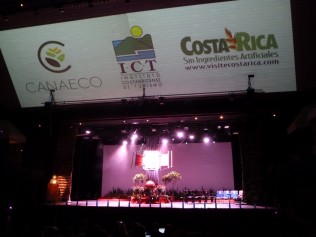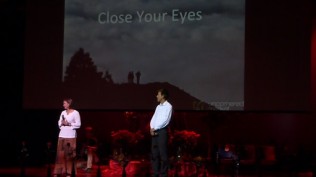Costa Rica—for many of us, just the name brings forth mental images of green rainforests, cloud-shrouded volcanos and, of course, beaches. Costa Rica has successfully branded itself as a sustainable tourism destination for many years, so its wildlife preserves and other natural resources are top-of-mind for many travelers.
This fame makes Costa Rica a good place for a sustainable tourism conference. From November 3 to 6 this year, the small nation hosted its fourth International Conference on Sustainable Tourism (Planet, People, Peace) in San Jose, organized by the Costa Rica National Ecotourism and Sustainable Tourism Chamber (CANAECO).

As explained by Glenn Jampol, the outgoing president of CANAECO, “The major goal of this conference is to convene both recognized national and international leaders in order to share their strategies, best practices, challenges and opportunities in the tourism industry, with the intention of offering companies, organizations, professionals and governmental agencies practical tools to increase tourism to a responsible activity, and to reaffirm the important role that Costa Rica has attained on a global level.”
Jampol is an internationally established hands-on expert in responsible tourism. Among other accomplishments, he conceived, developed and served as president of two award-winning sustainable hotels in Costa Rica: the Finca Rosa Blanca Coffee Plantation and Inn, and Arenas Del Mar Beachfront and Nature Resort (one of the most successful hotels in Costa Rica). As a pioneer and outspoken force for sustainability in hospitality, Jampol also serves on the advisory board for The International Ecotourism Society.
Unsurprisingly, the two dozen international, regional and domestic conference presenters agreed that sustainability is a critical part of the way companies must and will measure their success. Yet multiple presenters pointed out that sustainability still must prove its potency as a marketing tool.
That being said, one prominent take-home message was clear: New and inspiring evidence suggests sustainability is starting to offer both hope and answers in a world increasingly dominated by gloomy forecasts. However, the obstacles remain considerable, as a very recent article in the Guardian makes all too clear. We do indeed need to tell the sustainability story better, in a way that engenders positive feelings of hope for the future.

The conference was organized around five main modules that relate directly to sustainable tourism: Water, Earth, Air, Fire and Wind.
The “Water” module focused on green economies and the need for increased investment in sustainability to produce higher returns to the economy, environment and society. Julio Bin, a specialist in sustainable business development, spoke convincingly about how sustainable businesses should be working for the planet, replacing the notion of “profit” with “life.” He asked, “How would you feel going to work every day if your goal at the end of the year was to produce life?” Bin called on all of us to be more vocal Positive Deviants.
The “Earth” module tackled issues around sustainable destinations, showcasing efforts in sustainability that allow destinations not only to differentiate themselves in the market, but to add value to the overall visitor experience. Case studies from Costa Rica, Peru, Ecuador and the Canary Islands put meat on the bones of this topic. But it was the wise words of Judy Kepher-Goma, Executive Director of Kenya Land Conservation Trust, that reminded everyone of the importance of leadership. “We have created followers, not believers—people who wait to be told what to do,” she said. “They are not taking it or living it, they are following it.” Leaders must now step forward “to do what is right, not what is acceptable.”
The “Air” module took a close look at country brands and the need for them to be consistent with what countries offer. Strong examples were presented by experts from Costa Rica, Peru, Argentina, Australia and Norway. In all cases, sustainability was included as a core brand quality, along with uniqueness, credibility, authenticity and quality.
The “Fire” module examined how to market sustainability by examining strategies and mechanisms for communicating sustainability. One critical topic was whether mentioning sustainability works in marketing. Hans Pfister, President of Cayuga Sustainable Hospitality, provocatively suggested that it doesn’t, believing that the “words have been used and abused” and no longer have any competitive advantage. Instead, he said, everyone should “work on product, innovate, under-promise and over-deliver,” and value the importance of authentic experiences above that of certification.

Finally, the “Wind” module was a vision of the future that let artistic expression flow, including through the live percussion and poetry of John Densmore, drummer for The Doors.
As both an inspirational and informational event, the International Conference on Sustainable Tourism provided attendees with a strong sense both of where sustainable travel (and sustainability in general) is today and of where, with diligence and determination, it could be in the future.
One by one, tourism thought leaders, economists, brand specialists, destination marketers and representatives shared how new metrics, new perspectives, new visions and new practices—put in place at the community, corporate and country level—demonstrate the growing legitimacy and value of sustainable practices. The oft-mentioned silver lining is that these values are of benefit to all parties at every level, including quality of life for local communities, long-term profitability in companies, positive triple-bottom-line accounting for countries, and the survival of the planet.
The many benefits of sustainability are the reason conference attendees came together, and why they remain committed to the work they do. These thicker, stronger and more plentiful threads bind together the otherwise disparate and isolated-seeming qualities of land-conservation practices in Kenya, happiness metrics in Bhutan, nation-level tourism branding, and host nation Costa Rica’s long, successful track record in leveraging the value of protecting nature.
————————-
This article was researched by conference attendee Ethan Gelber and co-authored by Gelber and Michael McColl. Gelber’s participation was made possible in part by the Costa Rican Tourism Board and is one element of the #EcoCostaRica campaign undertaken by EcoAdventure Media.
Read Ethical Traveler's Reprint Policy.
